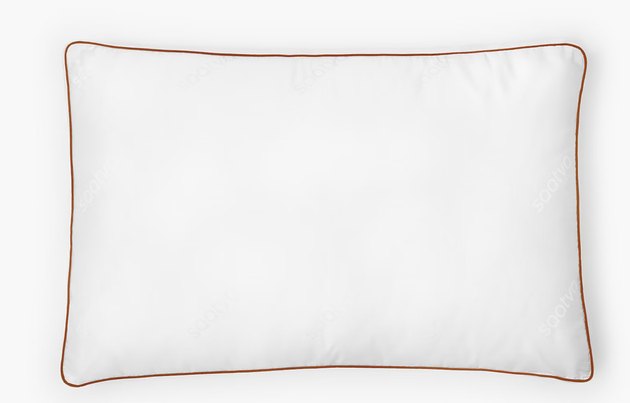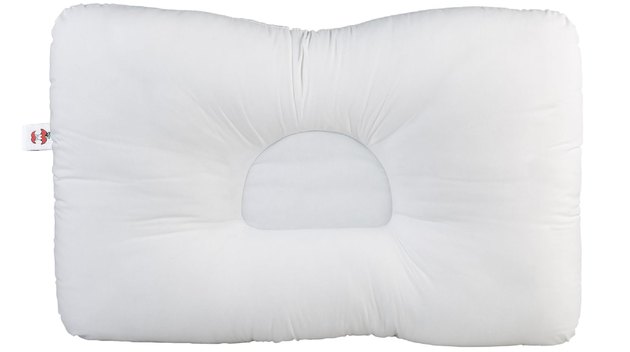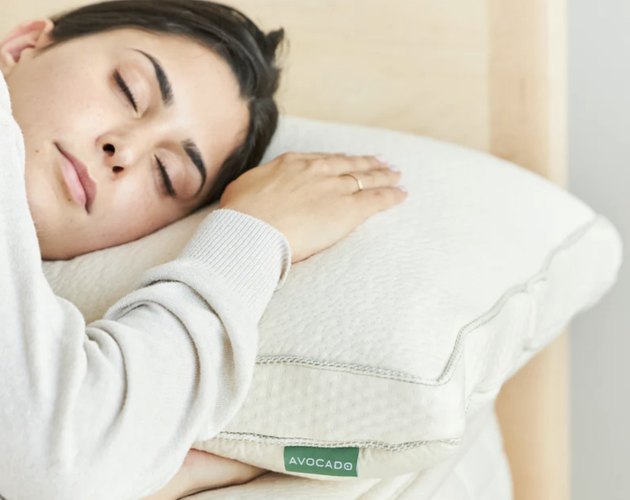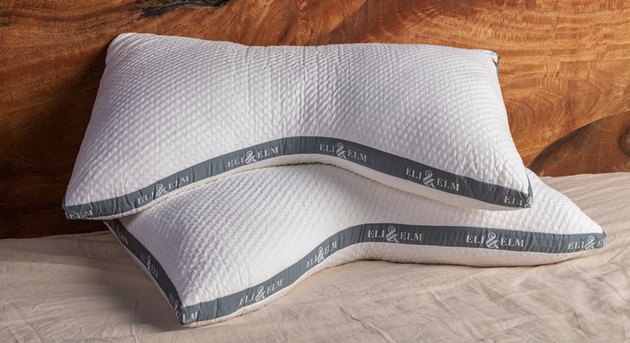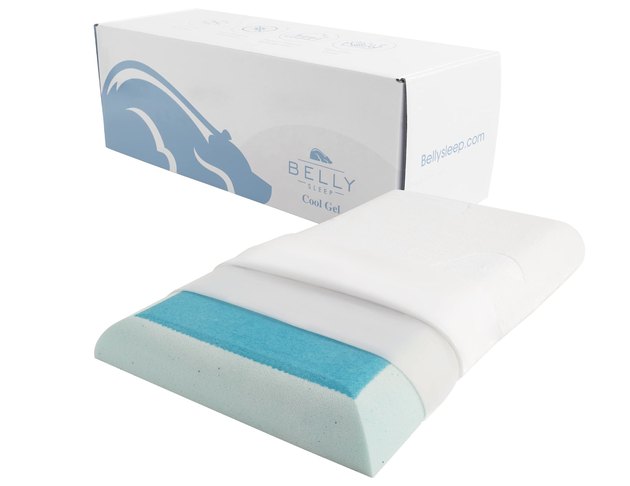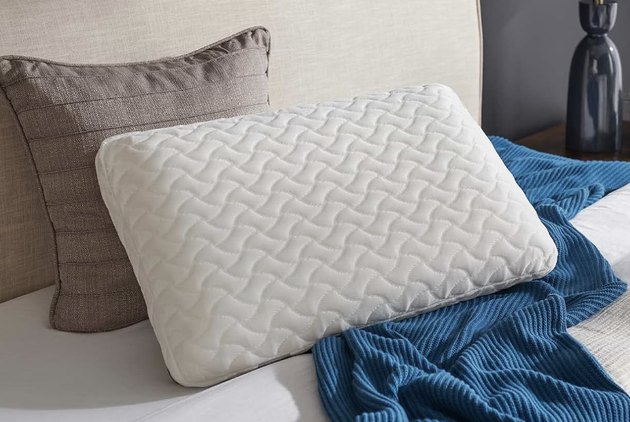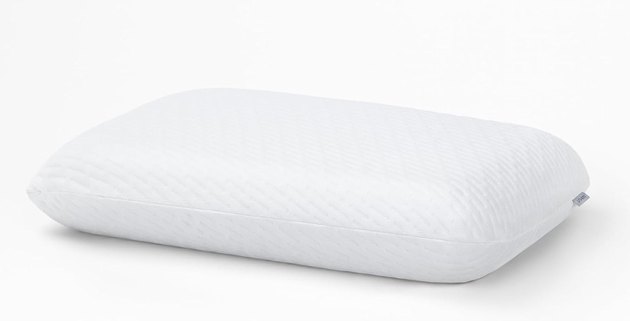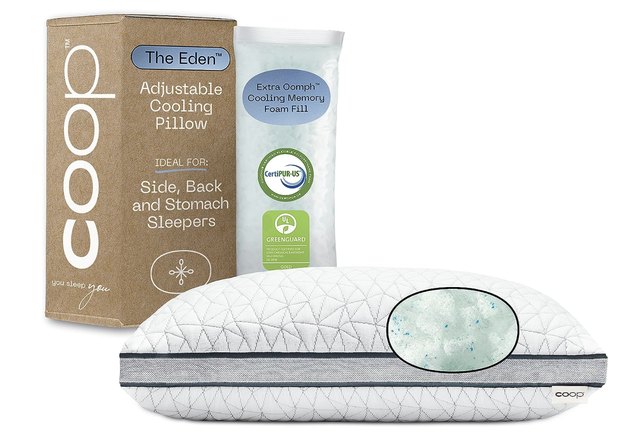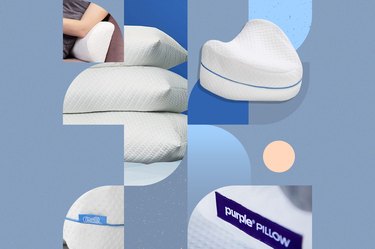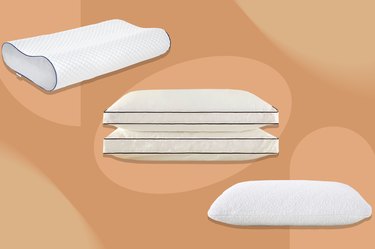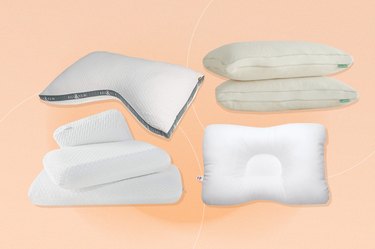
When it comes to certain areas of our lives, it pays to invest a little more time, energy and potentially money — and this is especially true when it comes to anything having to do with sleep.
After all, we spend about a third of our lives in dreamland. That's a lot of time with your head on a pillow — and if you have neck pain, choosing the right pillow is especially important.
Video of the Day
Video of the Day
Here are the best pillows for neck pain, according to sleep and neck pain experts, along with what to look for when you're shopping.
(Psst: Looking to upgrade your mattress, too? Check out the best mattresses for neck and back pain.)
The Best Pillows for Neck Pain
- Best Overall: Saatva Latex Pillow (From $165, Saatva.com)
- Best on a Budget: Core Products Tri-Core Cervical Support Pillow (From $33.13, Amazon)
- Best Luxury Buy: Avocado Organic Luxury Plush Pillow (From $229, AvocadoGreenMattress.com)
- Best for Side Sleepers: Eli & Elm Ultimate Pillow for Side Sleepers (From $109.99, EliandElm.com)
- Best for Stomach Sleepers: Belly Sleep Gel Infused Memory Foam Pillow (From $44.99, Amazon)
- Best Memory Foam: Tempur-Pedic TEMPUR-Cloud Pillow ($71, Amazon)
- Best Cooling: Tuft & Needle Original Foam Pillow (From $57.80, Amazon)
- Best Adjustable: Coop Home Goods Eden Adjustable Pillow (From $96, Amazon)
How We Chose
We tapped a sleep doctor and three chiropractors to learn what to look for in the best pillow for neck pain. We selected the below products based on their criteria, including:
- Height
- Shape
- Firmness
- Materials
- Price
Find more information on how we choose products here.
1. Saatva Latex Pillow
2. Core Products Tri-Core Cervical Support Pillow
3. Avocado Organic Luxury Plush Pillow
4. Eli & Elm Ultimate Pillow for Side Sleepers
5. Belly Sleep Gel Infused Memory Foam Pillow
6. Tempur-Pedic TEMPUR-Cloud Pillow
7. Tuft & Needle Original Foam Pillow
8. Coop Home Goods Eden Adjustable Pillow
What to Look for in a Pillow When You Have Neck Pain
Before you set out to buy the best pillow to relieve your neck pain, here are some important factors to keep in mind.
1. The Right Height
When it comes to sizing, pillows can really run the gamut, but you should spend some time thinking about what makes the most sense for you. The two major things to consider are the height of the pillow and your sleeping position, Friedman says.
"The neck has a 'C' curve shape, which acts as a shock absorber when we walk, run and jump and is needed to support and hold up the head," he says. "Sleeping with a straight neck for six to eight hours each night can eventually reduce this normal 'C' curvature."
When you sleep on a pillow that's too high, the neck tends to bend forward, which can cause an obstruction in your breathing as well as a lack of circulation throughout your body, he notes. If a pillow is too low, it can strain the muscles and joints of the neck, causing added pressure and discomfort.
"Ideally, a cervical pillow should be a height of four to six inches, with a curvature of approximately 42 degrees," Friedman says. "The neck should always be in a C-shaped curve that faces the opposite way your nose points."
2. Appropriate Price
Like anything else, when purchasing pillows, you tend to get what you pay for, Dr. Dasgupta says. "Investing in getting better sleep will pay off in the day with alertness, memory and concentration,"' he says. "If you have the opportunity to get better sleep, then I think that's going to be a good investment."
That being said, staying within the range of $30 to $150 is suitable. In other words, there's no reason to shell out hundreds of dollars on a single pillow, especially considering the fact that pillows need to be replaced usually every two years, according to the Sleep Foundation. "Not only does the material wear out, but they also build up an accumulation of skin cells, dust mites, fungus and mold," Friedman adds.
3. Supportive, Durable Material
In general, the filling of a pillow is what makes the difference when it comes to supporting the head and neck, as well as overall comfort, Dr. Dasgupta says. While there are plenty of different types of fillings, his personal favorite is memory foam, which is moldable to the shape of the head and neck, provides customized support and relieves the pressure points on the neck and head. He especially recommends memory foam for side sleepers because it helps keep their head and neck aligned.
Another type of material out there is latex. "Latex doesn't heat up as much as memory foam, which is good. But because it's latex, I always want to make sure that my patients don't have allergies, because that is a very common thing," Dr. Dasgupta says.
Polyester and cotton are also two common and inexpensive material choices for pillows, but Dr. Dasgupta says he's less likely to recommend them to patients because they become less supportive over time and have to be replaced more frequently.
4. Firm but Comfortable
Firmness is another important factor when shopping for a pillow to relieve neck pain. Dr. Dasgupta recommends selecting a pillow that's firm enough so your head is not tilted upwards — that it remains in proper spinal alignment — but is also comfortable enough so it doesn't interrupt your sleep quality through the night.
5. Appropriate for Your Sleeping Position
Whether you sleep on your back, side or stomach, your pillow should keep your head and neck in neutral alignment, Duncan says. "This is accomplished by a pillow that maintains your head and neck in a horizontal position without too much flexion or side bending."
Many brands will market certain pillows for back or side sleepers, Duncan notes.
"It should be mentioned that sleeping on your stomach isn't recommended because of the extreme rotation that it forces your neck into," he adds. "This sleeping posture is a common reason why people wake up with neck pain and stiffness."
6. Provides Pressure Relief
For someone with a loss of curve in their neck, or a degenerative condition, contoured pressure-relief pillows may provide some relief for back sleepers, Conrad says. "For sprains or strains, a memory foam pillow will help keep your neck stabilized while sleeping," he says. "This additional support for the cervical lordotic curve of your spine will help prevent additional spasm in your neck when you get up."
How the Right Pillow Can Help When Neck Pain Disrupts Sleep
"Everyone seems to understand the importance of wearing a comfortable pair of shoes that fit, but many don't apply this same importance to getting a comfortable support pillow when they sleep," Friedman says.
If you sleep on your back, a proper-fitting pillow allows your joints to align properly and your muscles and ligaments to relax, he says. And the right pillow can also aid side sleepers by preventing unnatural bending in the neck.
"Most people toss and turn through the night while they sleep, which can place the neck in strange positions and make spasms even worse when they wake up," Conrad says. "This can lead to a lack of sleep as well, which will affect how you feel the next day."
What's more: The right pillow may help prevent neck pain in the first place, Conrad says. And that's a boon for sleep. "Loss of sleep from neck pain can affect your entire day, from lack of production, to stiffness in the neck, as well as feeling tired all day," he says.
Unfortunately, using the wrong pillow can make neck pain worse. "If you are using a side-lying pillow, for example, and you lay face down on it, you can aggravate your condition," Conrad says.
The Best Sleeping Position for People With Neck Pain
When it comes to sleeping positions, Friedman suggests people with neck pain sleep on their back or side. "Stomach sleeping causes the neck to twist like a washrag being wrung out all night, which can lead to irritation of the joints, tendons and muscles," he says.
If you're a back sleeper, he recommends having a pillow with a curve in the front and an area that sinks in behind it where the head rests.
When sleeping on the side, he recommends that your shoulders not be placed at 90-degree angles to the mattress, as this can cause spasms in the upper trapezius muscles. "Shifting the shoulder one inch forward can help bring the head closer to the pillow and reduce waking up with neck and upper arm pain and/or numbness in the arms and hands," he adds.
When to See a Doctor
If you have aches and pains in your neck that last more than a week, it's a good idea to get checked out by your doctor, who can evaluate the pain and offer treatment recommendations based on exam findings.
- We spend about one-third of our life either sleeping or attempting to do so
- David Friedman, ND, DC, naturopathic doctor and clinical nutritionist
- Prevalence, Practice Patterns and Evidence for Chronic Neck Pain
- Allen Conrad, BS, DC, CSCS, the owner of Montgomery County Chiropractic Center in North Wales
- Raj Dasgupta, MD, pulmonary and sleep specialist
- How Often Should You Replace Your Pillows?
- Jordan Duncan, DC, a chiropractor at Silverdale Sport & Spine in Silverdale, Washington
Is this an emergency? If you are experiencing serious medical symptoms, please see the National Library of Medicine’s list of signs you need emergency medical attention or call 911.
